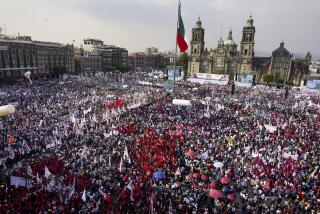Menem Favored in Argentine Vote : Election: Economic growth, lowered inflation will help president at polls Sunday. But challenger may force a runoff.
- Share via
BUENOS AIRES — President Carlos Menem has weathered corruption scandals in his administration, high unemployment rates and a national financial crisis this year to end up as the favored candidate in Argentina’s presidential elections set for Sunday.
Most pollsters say Menem, 64, is likely to win reelection in the first round.
But some give challenger Jose Bordon, 49, a small chance of forcing Menem into a runoff.
The latest polls show Menem leading with 45% to 47% of the vote, against 33% for Bordon. To avoid a runoff, Menem needs 45% of the vote, or at least 40% with a 10-point lead over the runner-up.
If Menem wins, he will be the first incumbent president reelected in Argentina since 1952, when the late Juan D. Peron won a second term. After Peron was overthrown in a 1955 coup, the constitution was changed to prohibit immediate reelection; Congress lifted that ban last year.
Menem belongs to the Justicialist Party founded by Peron.
Bordon, a senator and former provincial governor, also belonged to the Peronist party but dropped out because of differences with Menem. Bordon is backed by a center-left alliance known by an acronym, Frepaso.
Among other candidates running Sunday is Horacio Massaccesi, 47, governor of the Patagonian province of Rio Negro and a member of the traditional Radical Civic Union. Radical Raul Alfonsin won presidential elections in 1983 after seven years of military rule.
Massaccesi was Menem’s leading challenger until Bordon entered the race 2 1/2 months ago.
But in polls this week, Massaccesi was running a distant third, with a projected 14% to 16% of voters preferring him. He has been hurt by squabbles in the Radical Party and by the country’s painful memories of rampant inflation under Alfonsin, who left office in 1989 under dark economic clouds.
Since then, Menem’s pro-market program has brought inflation down to 4% a year, the lowest rate in South America. Meanwhile, Argentine economic growth has averaged a robust 7.6% a year since 1991.
Those accomplishments have won the loyalty of many voters for Menem, but others blame his economic policies for record unemployment of more than 12% a year.
“We have double the rate of three years ago,” Bordon complained this week. “It is the great failure of this administration.”
Menem has countered such criticism by promising to create more than 300,000 jobs a year under a five-year economic plan announced May 1.
“I’m going to solve it, but I need more time,” the president said in a television interview this week.
*
Bordon also blames Menem for what the challenger depicts as a climate of corruption in Argentina. And for some of Menem’s former supporters, the corruption issue is undoubtedly important.
Oscar Manzo, a bank employee, voted for Menem in 1989 but has switched his support since then.
“He is surrounded by people proven to be deeply involved in corruption,” said Manzo, 40, who was among thousands of people at a Thursday night rally for Bordon on Corrientes Avenue in downtown Buenos Aires.
But Manuel Mora y Araujo, a leading Argentine pollster, said the corruption issue has had little impact on voter intentions in recent months.
“Nobody changes his vote because of that,” he said. “They already know about it. They take it for granted.”
Voters are mostly concerned about economic issues, according to Mora y Araujo.
Since December, when the collapse of the Mexican peso sent shock waves through Latin America, depositors have withdrawn more than $7 billion from Argentina banks. A resulting “liquidity crisis” has triggered a recession in the Argentine economy.
Polls indicate that many voters do not know whether to blame the crisis on Menem’s economic policies and vote for Bordon, or stick with Menem on the theory that his experienced economic team is best able to handle the crisis. Such indecision, said pollster Mora y Araujo, throws an added measure of unpredictability into Sunday’s elections.
Some economists worry that if the elections go into a second round, cautious depositors might take their money out of banks until after the runoff vote.
A heavy drain could jeopardize the whole banking system, which has been badly weakened by earlier withdrawals.
“Today the system will not withstand the withdrawal of more than $1.5 billion,” said economist Nicolas Dujovne of the Macroeconomica research firm.
Menem’s campaign lately has played on such fears, warning of economic chaos and a return of hyper-inflation if Bordon wins.
“Fear of an Argentina from the past is a fear we all have,” said Alberto Kohan, secretary general of the Peronist party and one of Menem’s closest collaborators.
Bordon has promised to maintain and fine-tune Menem’s policies for monetary and fiscal stability.
But Roberto Garcia Moritan, a member of Bordon’s campaign team, said the challenger’s message has come across weakly because Menem’s well-financed campaign machine has dominated the media.
“We don’t have the same capacity to reach the public,” Garcia Moritan lamented.
More to Read
Sign up for Essential California
The most important California stories and recommendations in your inbox every morning.
You may occasionally receive promotional content from the Los Angeles Times.













